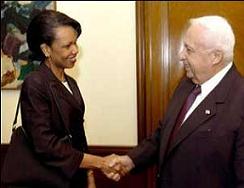
Last weekend saw some of the most self-contradictory statements to date on the U.S. ‘stance’ on Jewish settlements in the Occupied Palestinian Territories. Dan Kurtzer, the U.S. ambassador to Israel and U.S. Secretary of State Condoleezza Rice both initially criticized the latest major expansion move by Israel, and then, gradually or immediately retracted with statements such as “What we asked the Israelis some time ago was ‘can you explain to us what it is you're really doing?’ There is so much information, misinformation, who said this, who said that, no, it's just a tender, that the picture was just too confusing” (Rice to Washington Post, 26 March). On Monday, the Israeli prime minister (consequently?) announced that Israel has its own policy on settlements and does not really care what the U.S. says or thinks about it. This opportunistic move is now set to strengthen the Sharon government’s latest scandalous move regarding the settlements: the construction of 3,500 new housing units for illegal Jewish settlers on strategically chosen land – stolen land.
There was absolutely no need for the U.S. confusion. To begin with, international law, as well as the U.S.-sponsored road map to peace in the Middle East, is unambiguous: the first says settlements on Occupied Territories are illegal; the second says Israel should freeze settlement activity. Since the U.S. and Israel do not often consider themselves or each other subject to international law, especially with regard to the settlement issue, we should concentrate here on the diluted international opposition to the settlements as stated in the road map.
The 2003 road map, sponsored by the U.S., the UN, the EU, and Russia has two things to say about the settlements: (1) “Israel [must] immediately dismantle settlement outposts erected since March 2001,” and (2) in keeping “[c]onsistent with the Mitchell Report, the government of Israel [must] freeze all settlement activity (including natural growth of settlements).” These are not conditional statements. They are demands—demands that Israel ignores. Therefore, the initial statements by Kurtzer and Rice at the end of last week were entirely consistent with the road map: there is no understanding between Israel and the U.S. on the annexation of settlement blocs for a future expansion of Israel; Israel is endangering peace with its settlement expansions; and Israel is at odds with U.S. policy.
The Israeli daily newspaper Ha’aretz stated in an analysis on Sunday: “Officially, the Americans continue to oppose construction over the Green Line [the internationally accepted 1967 borders of Israel]. At the same time, they are not working too hard to prevent the strengthening of the settlement blocs.” This is not a policy; it is a contradiction in terms. That is why Sharon said on Sunday: “We can’t expect to receive explicit American agreement to build freely in the settlements.” Israel already has an implicit go-ahead from its Washington patron, one which flies in the face of international law, as well as the road map.
The history of this hair-raising hypocrisy goes back to an open letter that U.S. President Bush sent to Sharon a year ago. This letter, dated 14 April 2004, is treated by the two countries as if it were international law. It is, on the contrary, an invitation to Israel to ignore international law. Bush wrote: “In light of new realities on the ground, including already existing major Israeli population centers, it is unrealistic to expect that the outcome of final status negotiations will be a full and complete return to the armistice lines of 1949…”
Furthermore, halfway through her 180 degree sweep through U.S. policy on Israeli settlements this weekend Rice referred to this letter in the interview with the Washington Post on Saturday, saying “there has been a change in circumstances on the ground, large population centers have grown up.” Incidentally, this statement is not true. They have not grown up. They are not normal population centers. They are imposed on a population already there by an invading military power. They are placed according to strategic priorities on stolen land. They are illegal. Their inhabitants are not normal civilians. They are armed by the invading occupying force, and they enjoy many other legal and social privileges that the Palestinians driven out in the process do not enjoy, e.g., widespread impunity for violent crimes (as long as the crimes are carried out against Palestinians).
With the peace process now intensifying, it is high time for the other three sponsors of the road map, i.e. for the international community, to remind Israel and the U.S. that the 2004 letter, along with its concomitant diplomatic and logical acrobatics, negate the road map as well as international law, and they constitute a serious threat to the entire process. The developments this week have proven this. Furthermore, the road map itself is now in danger of becoming irrelevant. Therefore proactive measures must be considered. For example, a new Mideast Quartet meeting should establish new implementation mechanisms. The old ones are obviously not working in a satisfactory or acceptable manner.







